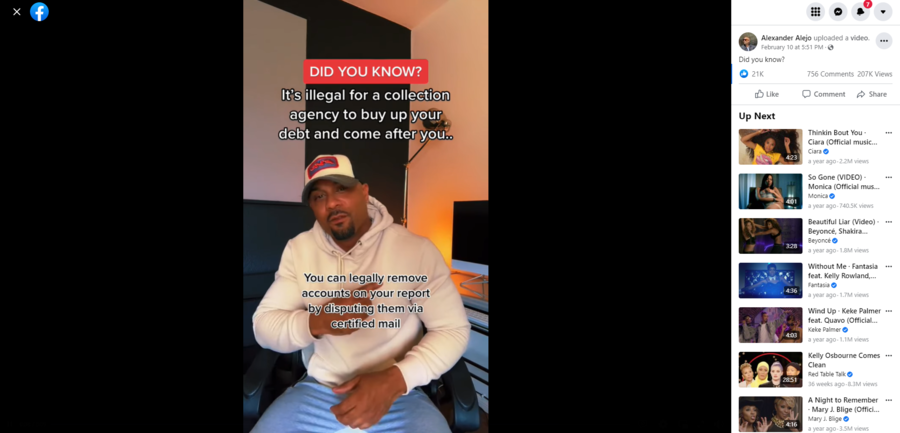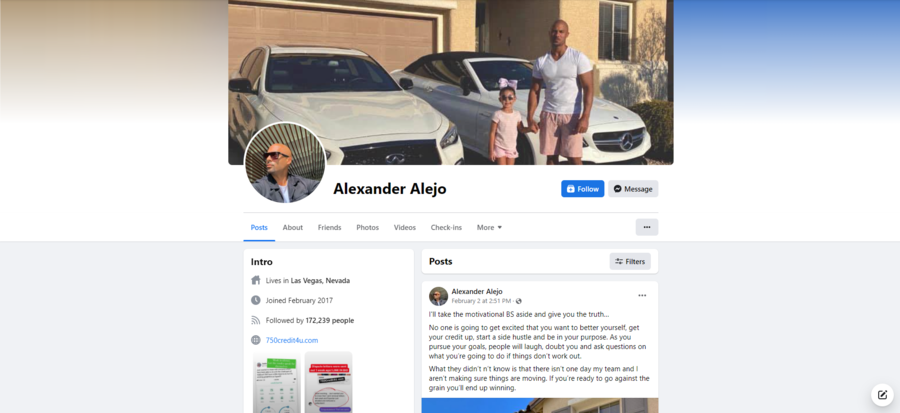
Is it illegal for a debt collection agency to buy a consumer's debt from the original creditor, and can a consumer remove accounts from their report simply by disputing them? Not exactly: Debt collection via the purchasing of debt from the original creditor is legal, and while disputing an account on a credit report is possible, that debt will only be removed if it is found to be erroneous.
The claims appeared in a Facebook video (archived here) published on February 10, 2022. The video's text is:
DID YOU KNOW?
It's illegal for a collection agency to buy up your debt and come after you..
You can legally remove accounts on your report by disputing them via certified mail
This is what the post looked like on Facebook at the time of writing:
(Source: Facebook screenshot taken on Mon Feb 14 15:26:59 2022 UTC)
Although the Facebook user who posted the video does not specify what country they are referring to, their Facebook page shows they are in Las Vegas, as shown in the screenshot below:
(Source: Facebook screenshot taken on Mon Feb 14 20:04:43 2022 UTC)
In the U.S., debt collectors, which can be individuals or agencies, are involved in debt assignment -- the lawful transfer of debt from the original creditor to a third party such as a debt collector. This debt is either passed along to the third party or purchased by the third party, with the ultimate goal being to collect the debt from the consumer.
In an email sent to Lead Stories on February 15, 2022, the Consumer Financial Protection Bureau (CFPB) explained that debt collection via purchase is considered legal:
Federal law generally allows the sale of legitimate consumer debts. Regulation F, the implementing regulation of the Fair Debt Collection Practices Act (FDCPA), prohibits debt collectors from selling a debt if the debt collector knows or should know that the debt was paid, settled, or discharged in bankruptcy, with certain exceptions.
However, the CFPB did note that certain states "have laws prohibiting or limiting the sale of medical debts to debt collectors." Those states include California, Maryland, New Mexico and Washington (see here and here).
On the federal level, the Fair Debt Collection Practices Act regulates how debt collectors can contact consumers. For example, threats of harm and false impersonation by debt collectors are illegal. However, while consumers can ask a debt collector to stop contacting them, that does not mean the collector or creditor cannot take legal action against the consumer for failing to pay legitimate debts.
Consumers also have the right to dispute the debt that a collector claims they owe under the Fair Credit Reporting Act. The CFPB published a resource explaining how to dispute debt collector information and states:
You have 30 days to dispute a debt or part of a debt within 30 days from when you first receive the required information from the debt collector. Once you dispute the debt, the debt collector can't call or contact you to collect the debt or the disputed part of the debt until the debt collector has provided verification of the debt in writing to you. Your dispute should be made in writing to ensure that the debt collector has to send you verification of the debt.
But submitting a dispute does not automatically mean that the consumer will get the specified account erased from a report. In its email to Lead Stories, the CFPB told us:
Of course, if the information is current and accurate, even if negative, the consumer will not be able to remove it. Some may claim that they can remove negative information, or even 'sweep clean' a consumer's entire credit history, but if the information in the report is accurate and current it's probably a credit repair scam.
There is also the question of disputing debts outside the scope of the FDCPA. In an email to Lead Stories on February 15, 2022, Jay Mayfield, a senior public affairs specialist for the Federal Trade Commission (FTC), linked us to a resource from the FTC that explains why negative but truthful information is usually not removed from a credit report:
Most negative information will stay on your report for seven years, and bankruptcy information will stay on for 10 years. Companies that promise to repair your credit can't remove truthful information -- it takes time to go away. There are exceptions. In certain situations -- like when you're being considered for a job paying more than $75,000 a year, or you're trying to get a loan or insurance valued at more than $150,000 -- a credit bureau may include older negative information on your report that wouldn't show up otherwise.
The CFPB also referred Lead Stories to an updated list of credit reporting companies, found here.




















